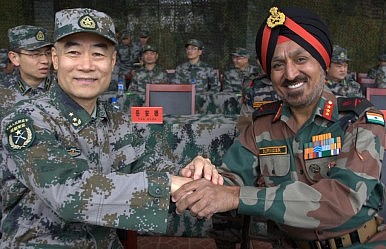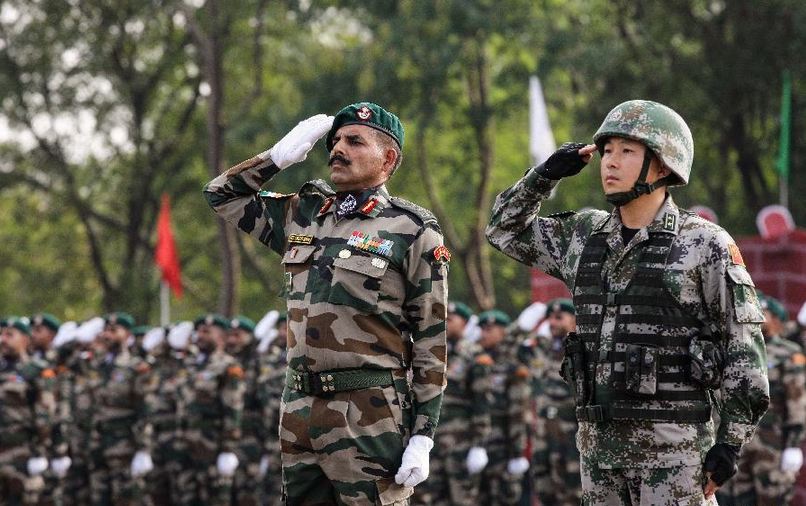Sulman Badshah
STAFF

- Joined
- Feb 22, 2014
- Messages
- 4,282
- Reaction score
- 34
- Country
- Location
ISLAMABAD:
South Asia appears to be on the cusp of a strategic realignment, though nobody is ready to talk about it candidly. Pakistan and Russia are set to hold their first-ever joint military exercises later this year, officials and diplomatic sources said on Sunday. Not only that, Islamabad is also considering purchase of advanced Russian warplanes.
The joint military drill is seen as another step in growing military-to-military cooperation, indicating a steady growth in bilateral relationship between the two countries, whose ties had been marred by Cold War rivalry for decades.
20 nations, including Pakistan join major military manoeuvre in Saudi
A senior Pakistani official said that around 200 military personnel from the two sides would take part in the joint military exercises scheduled for later this year.
Pakistan’s Ambassador to Moscow Qazi Khalilullah told The Express Tribune that this is the first time that military personnel from the two countries would be taking part in joint military drills, otherwise called ‘Friendship-2016’. He, however, did not divulge further details about the nature of the exercises or dates.
The development, Khalilullah said, reflected increased cooperation between the two countries. “This obviously indicates a desire on both sides to broaden defence and military-technical cooperation,” he separately told a Russian news agency last week.
Islamabad decided to broaden its foreign policy options after its relations with the United States deteriorated first due to a secret raid at Abbottabad to kill al Qaeda kingpin Osama bin Laden in May 2011 and then killing of 24 Pakistani soldiers in Nato airstrikes at Salala check post along the Afghan border.
The joint session of parliament after debating the negative fallout of the US and Nato actions approved the new foreign policy guidelines that envisaged reaching out to Russia.
Russia boosting ties with Pakistan: Putin
Based on the recommendations of the recent envoys’ conference, Pakistan’s foreign ministry also called for increased engagements with Russia.
Those recommendations also stemmed from recent developments where US lawmakers blocked funds for eight Lockheed Martin Corporation’s F-16 fighter jets. The US was supposed to partly fund the deal, paying $430 million, but US lawmakers blocked it for Pakistan’s apparent lack of action against militants.
Pakistan decided to look at alternative sources to purchase the aircraft including from Jordan, with Turkey offering to modernise Pakistan’s existing fleet of fighters.
Over the last 15 months, the chiefs of Pakistan’s Army, Navy and Air Force travelled to Russia in a development signalling the growing defence ties between the two countries. The flurry of high-level exchanges resulted in the signing of a deal between Pakistan and Russia for the purchase of four MI-35 attack helicopters.
The formal agreement, which was signed in Moscow in August 2015, was considered a major policy shift on part of Russia in the wake of growing strategic partnership between the US and India.
Moscow for long ignored Islamabad in a bid to please its long-term ally New Delhi. But as a result of India’s growing tilt towards the US, Russia has now begun to expand its cooperation with Pakistan.
For its part, Islamabad is eager to improve its ties with Moscow to diversify its options in the event of any stalemate in ties with Washington.
After securing a deal of MI-35 helicopters, Pakistan is also exploring options to buy Su-35 fighter jets from Russia. For this purpose, Chief of Air Staff Air Chief Marshal Sohail Aman visited Moscow in July.
The Pakistani ambassador said the PAF chief held ‘fruitful’ discussions with Russian authorities but would not provide further details of new military purchases, including the multirole, air superiority fighter Sukhoi Su-35.
Other defence officials were quoted by Russian news agency as saying that Pakistan was still in initial stages of negotiation for these weapons platforms and that the military was also looking at anti-tank weapons and air defense systems.
Published in The Express Tribune, September 12th, 2016.
South Asia appears to be on the cusp of a strategic realignment, though nobody is ready to talk about it candidly. Pakistan and Russia are set to hold their first-ever joint military exercises later this year, officials and diplomatic sources said on Sunday. Not only that, Islamabad is also considering purchase of advanced Russian warplanes.
The joint military drill is seen as another step in growing military-to-military cooperation, indicating a steady growth in bilateral relationship between the two countries, whose ties had been marred by Cold War rivalry for decades.
20 nations, including Pakistan join major military manoeuvre in Saudi
A senior Pakistani official said that around 200 military personnel from the two sides would take part in the joint military exercises scheduled for later this year.
Pakistan’s Ambassador to Moscow Qazi Khalilullah told The Express Tribune that this is the first time that military personnel from the two countries would be taking part in joint military drills, otherwise called ‘Friendship-2016’. He, however, did not divulge further details about the nature of the exercises or dates.
The development, Khalilullah said, reflected increased cooperation between the two countries. “This obviously indicates a desire on both sides to broaden defence and military-technical cooperation,” he separately told a Russian news agency last week.
Islamabad decided to broaden its foreign policy options after its relations with the United States deteriorated first due to a secret raid at Abbottabad to kill al Qaeda kingpin Osama bin Laden in May 2011 and then killing of 24 Pakistani soldiers in Nato airstrikes at Salala check post along the Afghan border.
The joint session of parliament after debating the negative fallout of the US and Nato actions approved the new foreign policy guidelines that envisaged reaching out to Russia.
Russia boosting ties with Pakistan: Putin
Based on the recommendations of the recent envoys’ conference, Pakistan’s foreign ministry also called for increased engagements with Russia.
Those recommendations also stemmed from recent developments where US lawmakers blocked funds for eight Lockheed Martin Corporation’s F-16 fighter jets. The US was supposed to partly fund the deal, paying $430 million, but US lawmakers blocked it for Pakistan’s apparent lack of action against militants.
Pakistan decided to look at alternative sources to purchase the aircraft including from Jordan, with Turkey offering to modernise Pakistan’s existing fleet of fighters.
Over the last 15 months, the chiefs of Pakistan’s Army, Navy and Air Force travelled to Russia in a development signalling the growing defence ties between the two countries. The flurry of high-level exchanges resulted in the signing of a deal between Pakistan and Russia for the purchase of four MI-35 attack helicopters.
The formal agreement, which was signed in Moscow in August 2015, was considered a major policy shift on part of Russia in the wake of growing strategic partnership between the US and India.
Moscow for long ignored Islamabad in a bid to please its long-term ally New Delhi. But as a result of India’s growing tilt towards the US, Russia has now begun to expand its cooperation with Pakistan.
For its part, Islamabad is eager to improve its ties with Moscow to diversify its options in the event of any stalemate in ties with Washington.
After securing a deal of MI-35 helicopters, Pakistan is also exploring options to buy Su-35 fighter jets from Russia. For this purpose, Chief of Air Staff Air Chief Marshal Sohail Aman visited Moscow in July.
The Pakistani ambassador said the PAF chief held ‘fruitful’ discussions with Russian authorities but would not provide further details of new military purchases, including the multirole, air superiority fighter Sukhoi Su-35.
Other defence officials were quoted by Russian news agency as saying that Pakistan was still in initial stages of negotiation for these weapons platforms and that the military was also looking at anti-tank weapons and air defense systems.
Published in The Express Tribune, September 12th, 2016.













